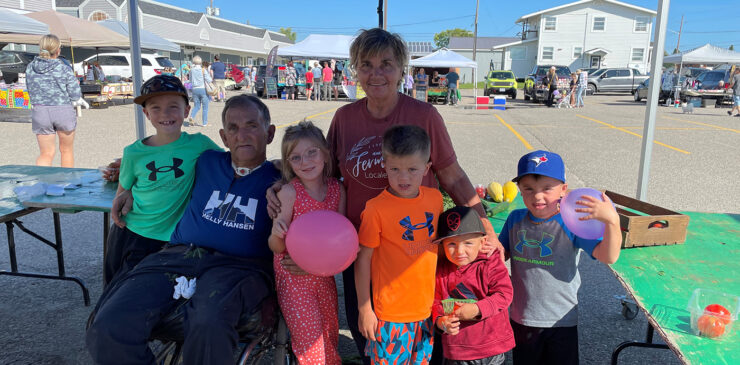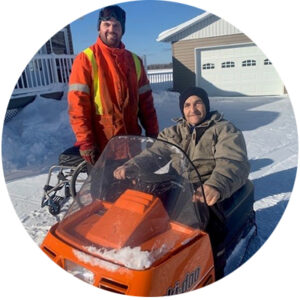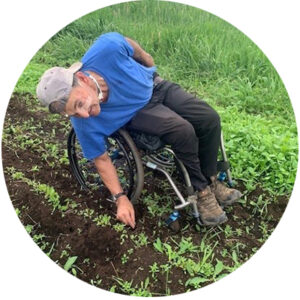
Cultivating Perseverance

Spinal Cord Injury Ontario, Newsletter
VoicesFall/Winter 2024
Cultivating Perseverance
“The farmer has to be an optimist or he wouldn’t still be a farmer.” – Will Rogers
Farmers know that they can’t control everything. They can work hard, plan, and try to protect their crops, herd and home, but in the end, nature will make its own plan. Loyola and Suzanne Sylvain understand this very well. Married for 43 years, they have run their farm since 1986. For years, they were dairy farmers near Kapuskasing. Then, 14 years ago, their lives changed when Loyola was in an accident and sustained a spinal cord injury at the T4/T5 level. They couldn’t have planned for what life would be like after an SCI. They needed to work hard and find their way, something they were used to doing.
Loyola spent many months in rehab at The Ottawa Hospital Rehab Centre, where he needed to learn how to live with a spinal cord injury. Suzanne explique: “Lorsqu’il est arrivé il était comme un semis, et au cours de son séjour au Centre de réadaptation il s’épanouit peu à peu en devenant chaque jour plus fort, en retrouvant son indépendance et en s’adaptant à sa nouvelle vie”.
[Suzanne explains: “When he arrived, he was like a seedling, and during his stay at the Rehabilitation Center, he blossomed little by little, becoming stronger every day, regaining his independence and adapting to his new life.”]
I witnessed the transition from an introverted and shy man, very weakened by his accident, who quietly regained his powers and his health with rehabilitation, burgeoning into a more interactive person.
Spinal Cord Injury Ontario Service Navigation Coordinator Angela Clair first met Loyola and Suzanne at the rehab centre. Dit Angela, “J`ai témoigneéla transition d`un homme introverti et timide; ainsi que très affaibli de son accident, qui avec la réhabilitation, reprenait tranquillement ses puissances et sa santé; ainsi qui bourgeonnait en personne plus interactive. On voyait Loyola qui approchait les autres pour poser des questions à propos du vélo adaptéé pour personne avec mobilité réduite ou le ski de fond adapté, pour savoir d`avantage comment si prendre pour reprendre sa vie.”
[Angela says, “I witnessed the transition from an introverted and shy man, very weakened by his accident, who quietly regained his powers and his health with rehabilitation, burgeoning into a more interactive person. We saw Loyola approaching others to ask questions about adapted cycling for people with reduced mobility or adapted cross-country skiing to find out more about how to get back to life.”]
 Loyola knew the only way to live life was to keep going regardless of the different circumstances he found himself in. “If you stop, you go backwards,” he says. “S’il n’avait pas de persévérance,” dit Suzanne, “il ne serait pas rendu où il est. On s’est dit que c’est un nouveau chapitre dans notre vie. C’est certain que d’accepter la situation dans laquelle il était, ce n’était pas toujours facile. On s’est dit qu’on ne peut pas rester à pleurnicher. Il faut que tu aies des buts dans la vie aussi!”
Loyola knew the only way to live life was to keep going regardless of the different circumstances he found himself in. “If you stop, you go backwards,” he says. “S’il n’avait pas de persévérance,” dit Suzanne, “il ne serait pas rendu où il est. On s’est dit que c’est un nouveau chapitre dans notre vie. C’est certain que d’accepter la situation dans laquelle il était, ce n’était pas toujours facile. On s’est dit qu’on ne peut pas rester à pleurnicher. Il faut que tu aies des buts dans la vie aussi!”
[“If he didn’t have perseverance,” says Suzanne, “he wouldn’t be where he is. We told ourselves that this is a new chapter in our lives. Certainly, accepting the situation he was in wasn’t always easy. We told ourselves that we can’t stay whining. You have to have goals in life too!”]
These goals included returning to farming. With the help of friends in the community and his own hard work, Loyola was able to adapt his agricultural machinery and move from dairy farming to market gardening and field crops. Managing a local farmer’s market, Loyola helps others in the community bring their produce and products to the public.
Their community rallied around the Sylvains when they needed help, and volunteers continue to support them, which they appreciate. In return, the family does what it can to help the community. They began a school education program to help the next generation learn about gardening and farming, as well as donate excess vegetables to seniors’ residences. They even created a garden at the Rehab hospital all those years ago when Loyola was in residence.
Loyola also tries to make things better for individuals with disabilities and seniors by helping to make changes through his work on accessibility committees. He recognized that sometimes it takes someone with a disability to point out the issues. “Do you have to wait for people to get hurt before you make changes?” he asks. They always advocate and educate the public about accessibility and the needs of people with disabilities. They’ve passed their passion for helping their community to their four children and five grandchildren. Even the youngest get involved, using their wagons to help seniors or people with disabilities get their purchases back to the car at the farmer’s market.
 Before his accident, Loyola was a marathoner. He returned in his wheelchair and rolled the 21km for four years. “I was the first to start and the last to finish,” he says, but he did finish. Suzanne says, “He doesn’t have any stop in him.” While he no longer participates in marathons, he rarely slows down and always finds ways to keep busy.
Before his accident, Loyola was a marathoner. He returned in his wheelchair and rolled the 21km for four years. “I was the first to start and the last to finish,” he says, but he did finish. Suzanne says, “He doesn’t have any stop in him.” While he no longer participates in marathons, he rarely slows down and always finds ways to keep busy.
Life with a disability in a rural community can be challenging. The lack of resources, programs, or accessibility can make things difficult. However, the support they receive from their family, friends, and neighbours makes living on their farm and enjoying their lives to the fullest extent possible. They wouldn’t want to be anywhere else. Loyola and Suzanne agree: “We are grateful for what we have around us and don’t focus on what we don’t have.”
Multiple Myeloma Survivor Stories
I hope these videos will offer not just inspiration for those of us with a multiple myeloma diagnosis but it will offer some insights into how each of these people have overcome, treatments and things that they have done to improve their life.
Dave never expected the pain in his back would turn out to be caused by cancer. He turned to Winship's world-renowned team of multiple myeloma specialists to treat and manage the blood cancer that was the culprit. 8
Andy lost his first wife to multiple myeloma, then twelve years later, Andy himself was struck by the same disease.
Multiple myeloma patient Judith shares her personal journey of empowerment in this Patient Empowerment Network program. Watch as she explains how seeking a second opinion after her diagnosis changed the path of her treatment and life with multiple myeloma. Judith's advice: "Don't be afraid to get a second opinion or even a third opinion. Getting a second opinion saved my life. 20